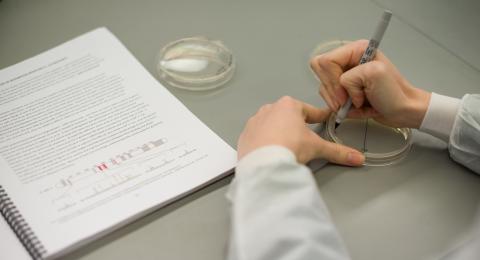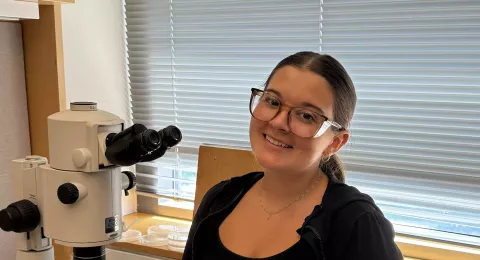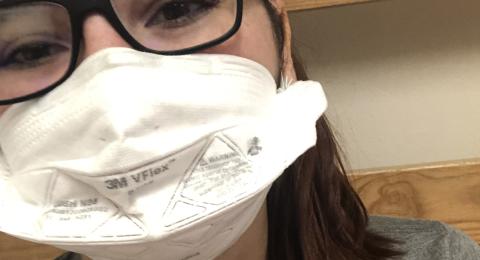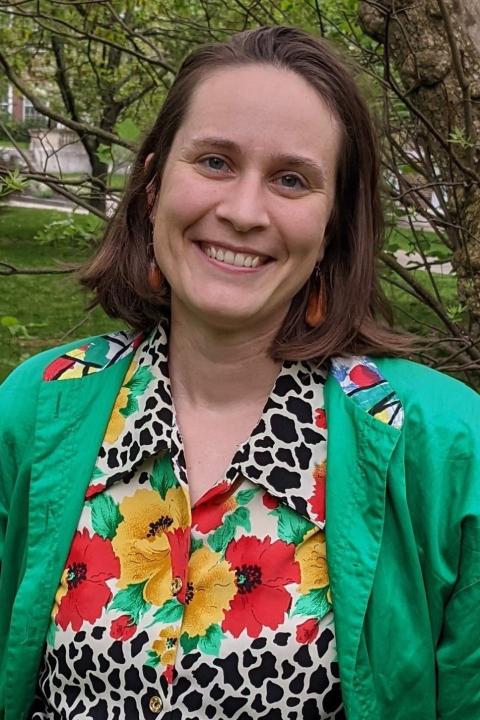Choosing to major in Genetics at UNH offers you a deep dive into the study of genes, heredity and variation in living organisms. This field provides essential insights into how genetic information is transmitted and expressed, paving the way for advancements in medicine, agriculture and biotechnology. You will benefit from cutting-edge research opportunities, hands-on laboratory experience, and a curriculum that covers molecular genetics, genomics and bioinformatics. This major appeals to students with a strong interest in biology and a passion for understanding the molecular foundations of life as well as problem-solving and research.
What is genetics?
Genetics majors are interested in understanding how DNA, along with the environment, specifies simple traits like hair color to more complex traits like high blood pressure, diabetes and mental illness.Geneticists are also interested in how these traits are inherited and regulated. Genetics is a very broad field of study, encompassing topics such as evolution, genetic engineering, genomics, bioinformatics and the genetics of microbes, plants and animals. The faculty strongly value hands-on learning and many students conduct undergraduate research under faculty supervision in our state-of-the-art research laboratories. Graduates are prepared for successful careers in biomedical-or biotechnology-related fields or for entry into graduate school or health professional programs.
Why study genetics at UNH?
UNH has one of the few dedicated genetics majors in the United States.Students in the genetics degree program interact with faculty committed to excellence in teaching, research and student advising, and our teaching labs provide hands-on training in current research techniques. Our faculty conduct research on diverse topics including evolution, gene structure and function, host-microbe interactions, genome sequencing and analysis, heredity, and population diversity. There are many opportunities for students to work in faculty laboratories and present research at scientific conferences both on and off campus.
Potential careers
- Research scientist (biotechnology, biomedical, agriculture, etc.)
- Genetic counselor
- Forensic scientist
- Technical support assistant
- Physician
- Physician assistant
- Educator
Curriculum & Requirements
The Genetics program (GEN) explores the world of genetics and genomics in plants, animals, and microbes. Genetics majors are interested in understanding how DNA, along with the environment, specifies simple traits like hair color to more complex traits like high blood pressure, diabetes, and mental illness. The Genetics faculty strongly value hands-on learning and many GEN students conduct undergraduate research under the supervision of our faculty. GEN graduates are prepared for successful careers in the biotechnology fields or for entry into a variety of graduate school, genetic counseling, or health professional programs.
The Genetics program offers course work and laboratories in:
- molecular genetics
- bioinformatics
- human genetics
- comparative genomics
- plant genetics
- microbial genetics and evolution
- population and evolutionary genetics
Students in the Genetics program may participate in a variety of experiential learning activities including:
- independent research experiences in laboratories of UNH faculty
- work at the Hubbard Center for Genome Studies or Research Computing Center
- internships at biotechnology companies in the Greater Boston area
- internships with genetics counselors at area medical centers
GEN graduates have been successful in attaining careers as:
- research scientists and laboratory technicians in
- biotechnology and pharmaceutical companies
- academic research programs
- forensics
- biomedical research centers & medical schools
- government agencies
- genetic counselors
- educators
- technical support associates
GEN graduates are prepared for further education in:
- professional health programs
- genetic counseling
- medical school
- dental school
- allied health programs (physician assistant, pharmacist, nursing or pathologist’s assistant programs)
- veterinary school
- graduate programs such as
- Genetics and Genomics
- Integrative Biology
- Neurogenomics
- Molecular Biology
- Microbiology
- Environmental Sciences
- Public Health
- Computer Science
Sample Degree Plan
This sample degree plan serves as a general guide; students collaborate with their academic advisor to develop a personalized degree plan to meet their academic goals and program requirements.
| First Year | ||
|---|---|---|
| Fall | Credits | |
| BIOL 411 | Introductory Biology: Molecular and Cellular | 4 |
| MCBS 401 | Professional Perspectives in Molecular, Cellular, and Biomedical Sciences | 1 |
| ENGL 401 | First-Year Writing | 4 |
| CHEM 403 | General Chemistry I | 4 |
| Discovery course | 4 | |
| Credits | 17 | |
| Spring | ||
| BIOL 412 | Introductory Biology: Evolution, Biodiversity and Ecology | 4 |
| MATH 424B | Calculus for Life Sciences | 4 |
| CHEM 404 | General Chemistry II | 4 |
| Discovery course | 4 | |
| Credits | 16 | |
| Second Year | ||
| Fall | ||
| GEN 604 | Principles of Genetics | 4 |
| BMCB 605 | Principles of Cell Biology | 4 |
| BIOL 528 | Applied Biostatistics I | 4 |
| Discovery course | 4 | |
| Credits | 16 | |
| Spring | ||
| GEN 606 | Genetics Lab | 4 |
| BMS 503 & BMS 504 | General Microbiology and General Microbiology Laboratory | 5 |
| CHEM 545 & CHEM 546 | Organic Chemistry and Organic Chemistry Laboratory | 5 |
| Discovery course | 4 | |
| Credits | 18 | |
| Third Year | ||
| Fall | ||
| BMCB 658 & BMCB 659 | General Biochemistry and General Biochemistry Lab | 5 |
| PHYS 401 | Introduction to Physics I | 4 |
| Discovery course | 4 | |
| Elective (any course) | 4 | |
| Credits | 17 | |
| Spring | ||
| GEN 711 | Genomics and Bioinformatics | 4 |
| PHYS 402 | Introduction to Physics II | 4 |
| Major Elective (Population or Evolutionary Genetics) | 4 | |
| Discovery course | 4 | |
| Credits | 16 | |
| Fourth Year | ||
| Fall | ||
| Genetics Core course | 4 | |
| Major Elective (Laboratory based) | 4-5 | |
| Major Elective (Bioscience/possible Capstone) | 4-5 | |
| Elective (any course) | 4 | |
| Credits | 16-18 | |
| Spring | ||
| Major Elective (Bioscience) | 4 | |
| Elective (any course) | 4 | |
| Elective (any course) | 4 | |
| Credits | 12 | |
| Total Credits | 128-130 | |
Degree Requirements
All Major, Option and Elective Requirements as indicated.
*Major GPA requirements as indicated.
Major Requirements
Students majoring in genetics take seven Foundation courses, six Bioscience Core courses, four Genetics Core courses and four Major Elective courses. One capstone experience, supervised and approved within the major, is required of all seniors. In addition, all other University requirements must be completed, including those for the University Discovery Program and Writing Program.
A minimum grade of C- minus or better is required in Statistics and all Bioscience Core, Genetics Core, and Major Elective courses.
Required Courses
| Code | Title | Credits |
|---|---|---|
| Foundation Courses | ||
| CHEM 403 | General Chemistry I 1 | 4 |
| CHEM 404 | General Chemistry II | 4 |
| CHEM 545 & CHEM 546 | Organic Chemistry and Organic Chemistry Laboratory 2 | 5 |
| MATH 424B | Calculus for Life Sciences 3 | 4 |
| BIOL 528 | Applied Biostatistics I | 4 |
| PHYS 401 | Introduction to Physics I | 4 |
| PHYS 402 | Introduction to Physics II | 4 |
- 1
Fulfills Physical Science Discovery requirement
- 2
Students applying to health profession schools need a full year of Organic Chemistry, a full year of Introductory Biology, as well as a full year of English. CHEM 651/CHEM 653 and CHEM 652/CHEM 654 should be taken in place of CHEM 545/CHEM 546; ENGL 502 or ENGL 503 in suggested in addition to ENGL 401. See Pre-Professional Health Program Advising.
- 3
Fulfills Quantitative Reasoning Discovery requirement
| Code | Title | Credits |
|---|---|---|
| Bioscience Core Courses | ||
| BIOL 411 | Introductory Biology: Molecular and Cellular 4 | 4 |
| BIOL 412 | Introductory Biology: Evolution, Biodiversity and Ecology | 4 |
| GEN 604 | Principles of Genetics | 4 |
| BMS 503 & BMS 504 | General Microbiology and General Microbiology Laboratory | 5 |
| BMCB 605 | Principles of Cell Biology | 4 |
| BMCB 658 & BMCB 659 | General Biochemistry and General Biochemistry Lab | 5 |
- 4
Fulfills Biological Science Discovery requirement, Discovery Inquiry requirement, and Discovery laboratory requirement
| Code | Title | Credits |
|---|---|---|
| Genetics Core Courses | ||
| GEN 606 | Genetics Lab | 4 |
| GEN 711 | Genomics and Bioinformatics | 4 |
| GEN 704 | Microbial Genetics and Genomics 5 | 5 |
| or GEN 771 | Molecular Genetics | |
| MCBS 401 | Professional Perspectives in Molecular, Cellular, and Biomedical Sciences | 1 |
Electives
Four (4) unique major electives are required from the below categories.
| Code | Title | Credits |
|---|---|---|
| Laboratory-Based Electives | ||
| Select one from the following: | ||
| GEN 704 | Microbial Genetics and Genomics 5 | 5 |
| GEN 705 & GEN 725 | Population Genetics and Population Genetics Lab 5 | 5 |
| GEN 717 | Molecular Microbiology | 5 |
| GEN 795 | Investigations in Genetics (4-credit minimum) 6 | 1-4 |
| GEN 795W | Investigations in Genetics (4-credit minimum) 6 | 1-4 |
| GEN 799 | Senior Thesis (4-credit minimum) 6 | 1-4 |
| GEN 799H | Honors Senior Thesis (4-credit minimum) 6 | 1-4 |
| BMCB 753 | Cell Culture | 5 |
| BMCB 754 | Molecular Biology Research Methods | 5 |
| INCO 790 | Advanced Research Experience (4-credit minimum) 6 | 1-4 |
| Code | Title | Credits |
|---|---|---|
| Population/Evolutionary Genetics Electives | ||
| Select one from the following: | ||
| GEN 705 & GEN 725 | Population Genetics and Population Genetics Lab 5 | 5 |
| GEN 715 | Molecular Evolution | 4 |
| GEN 772 | Evolutionary Genetics of Plants | 4 |
- 5
Where listed, this course may fulfill another category (Genetics Core, Laboratory-Based Major Elective, or Population/Evolutionary Genetics Major Elective), IF students take one additional Bioscience Major Elective.
- 6
Must be a research project with a genetics focus.
| Code | Title | Credits |
|---|---|---|
| Bioscience Electives | ||
| Select two from the following: | ||
| GEN 704 | Microbial Genetics and Genomics 5 | 5 |
| GEN 705 & GEN 725 | Population Genetics and Population Genetics Lab 5 | 5 |
| GEN 706 | Human Genetics | 4 |
| GEN 712 | Programming for Bioinformatics | 5 |
| GEN 713 | Microbial Ecology and Evolution | 4 |
| GEN 715 | Molecular Evolution | 4 |
| GEN 717 | Molecular Microbiology | 5 |
| GEN 721 | Comparative Genomics | 4 |
| GEN 771 | Molecular Genetics | 4 |
| GEN 772 | Evolutionary Genetics of Plants | 4 |
| GEN 795 | Investigations in Genetics (4-credit minimum) 6 | 1-4 |
| GEN 795W | Investigations in Genetics (4-credit minimum) 6 | 1-4 |
| GEN 799 | Senior Thesis (4-credit minimum) 6 | 1-4 |
| GEN 799H | Honors Senior Thesis (4-credit minimum) 6 | 1-4 |
| ANSC 602 | Animal Rights and Societal Issues | 4 |
| ANSC 612 | Genetics of Animals | 4 |
| ANSC 701 | Physiology of Reproduction | 4 |
| BIOL 704 | Plant-Microbe Interactions | 3 |
| BIOL 706 | Data Science with R for the Life Sciences | 4 |
| BIOL 711 | Experimental Design & Analysis | 4 |
| BMCB 750 | Physical Biochemistry | 3 |
| BMCB 753 | Cell Culture | 5 |
| BMCB 754 | Molecular Biology Research Methods | 5 |
| BMCB 760 | Pharmacology | 4 |
| BMCB 763 | Biochemistry of Cancer | 4 |
| BMCB 794 | Protein Structure and Function | 4 |
| BMS 650 | Molecular Diagnostics | 4 |
| BMS 702 | Endocrinology | 4 |
| BMS 705 | Immunology | 3 |
| BMS 706 | Virology | 3 |
| BMS 718 | Mammalian Physiology | 4 |
| BMS 719 | Host-Microbe Interactions | 4 |
| BMS 735 | Molecular and Cellular Parasitology | 4 |
| BMS 740 | Human Microbiome | 4 |
| INCO 790 | Advanced Research Experience (4-credit minimum) | 1-4 |
| NR 706 | Soil Ecology | 4 |
| ZOOL 625 & ZOOL 626W | Principles of Animal Physiology and Animal Physiology Laboratory | 5 |
| ZOOL 690 | Evolution | 4 |
| ZOOL 736 | Genes and Behavior | 4 |
| ZOOL 777W | Neuroethology | 4 |
Capstone
The capstone explores areas of interest based on the integration of prior learning. The capstone requirement may be satisfied through a course, created work or product, or some form of experiential learning (e.g., honors thesis, mentored research project, or other special student activity). Students may take more than one capstone course. Capstone completion is never displayed on Degree Works; your advisor will certify capstone completion at the time of graduation. Students must have 90 credits or more when completing their capstone requirement. Contact your advisor for questions about capstones.
| Code | Title | Credits |
|---|---|---|
| Approved Capstone Courses | ||
| GEN 704 | Microbial Genetics and Genomics | 5 |
| GEN 705 & GEN 725 | Population Genetics and Population Genetics Lab | 5 |
| GEN 715 | Molecular Evolution | 4 |
| GEN 717 | Molecular Microbiology | 5 |
| GEN 790 | Undergraduate Teaching Experience (4 credit minimum; classroom presentation required) | 1-4 |
| GEN 795 | Investigations in Genetics (4-credit minimum) 6 | 1-4 |
| GEN 795W | Investigations in Genetics (4-credit minimum) 6 | 1-4 |
| GEN 799 | Senior Thesis (4-credit minimum) 6 | 1-4 |
| GEN 799H | Honors Senior Thesis (4-credit minimum) 6 | 1-4 |
| INCO 790 | Advanced Research Experience (4-credit minimum) 6 | 1-4 |
- 6
Must be a research project with a genetics focus.
Program Learning Outcomes
Core Knowledge in Genetics
- Students will be able to describe DNA, its role, structure, how DNA is packaged in the chromosomes in terms of histones, nucleosomes, and chromatin, including its discovery, how has modern genomics influenced, and differences between prokaryotes and eukaryotes.
- Students will be able to describe the central dogma of molecular biology, including specific details related to replication, transcription, and translation.
- Students will be able to define and describe evolution, how drift, gene flow, mutation, natural selection, recombination, within a population genetic framework, may result in evolution.
- Students will be able to describe the differences between mitosis and meiosis and how errors in these processes may effect phenotype, cause disease, etc.
- Students will be able to evaluate how genes and the environment can interact to produce a phenotype, including allelic differences and changes in gene regulation.
- Students will be able to describe the concept of deep time, and how comparing genes and genomes allows us to understand evolution and relatedness between species.
- Students will be able to use pedigrees to determine mode of inheritance of a trait.
- Students will be able to describe ethical issues related to modern genomics and implications for health care and insurance, interpersonal relationships, family planning, etc.
- Students will be able to describe high-throughput sequencing, and how it has changed the practice of modern genetics.
Quantitative Literacy, Inquiry & Analysis
- Students will be able to apply the scientific method to examine experimental evidence and draw informed conclusions.
- Students will be able to use graphs to represent scientific data.
- Students will be able to apply statistical methods to interpret scientific data.
Critical Thinking & Problem Solving
- Students will be able to use data to troubleshoot an unexpected outcome .
- Students will be able to apply core knowledge to critically interpret scientific data.
Written Communication
- Students will demonstrate written skills to communicate scientific knowledge and experimental data.
Oral Communication
- Students will be able to demonstrate oral presentation skills to communicate scientific knowledge and experimental data.
Explore Program Details
About one-third of our majors are interested in Genetic Counseling. About an equal number are interested in going on to graduate school to get a master’s or Ph.D. or to professional school (physician assistant school, medical school, and veterinary school are the most common). The remainder are interested in getting a job immediately after receiving their Bachelor of Science degree; many of these students find work as Research Associates in biotech or biomedical research either in NH or in the Boston area, while others work in scientific sales or get jobs with science-related non-profits, to give just a few examples.
In general, no. Most students have reasonable time management and study skills by the time they get to UNH. In the 1-credit Freshman Orientation seminar (Professional Perspectives in Genetics), we provide additional resources to help students set academic goals and organize their time, so they start strong.
For students interested in genetic counseling, a career that requires a solid knowledge of genetics and skills in counseling, Psychology is a popular minor. Otherwise, students who are interested in a minor choose lots of different things, depending on their personal interests or career goals. Genetics majors have minored in Studio Art, Applied Math, German, Business, etc.
Absolutely! Studying abroad takes advance planning with your advisor and with the Education Abroad office. Generally, you want to reserve some of your discovery courses (gen eds) for when you go abroad. For instance, you will get the world cultures discovery credit automatically if you do a semester abroad, so you’ll want to hold off on taking those courses at UNH. Also, it’s usually easier to find discovery courses that will transfer back to UNH than it is to find genetics courses that are equivalent, depending on the international program that you choose. Plus, discovery courses taken abroad give you an opportunity to learn more about the history, literature, and culture of the country you are visiting.
It depends on what you are looking for. Quite a few genetics majors live in Peterson because it has a residential learning community (RLC) dedicated to the life sciences. Additionally, Lord, Williamson, Alexander, and Christianson are freshman-only dorms and that can be beneficial for meeting new people. You can also live in dorms with a mix of students, which allows you to meet juniors or seniors who can share their strategies for success. When signing up for housing as a first-year student, you will rank categories of dorms based on size and themes.
Yes, freshmen can do research with a faculty member. However, your first priority is your academic success, so it is often prudent to wait at least one semester to make sure that you can handle the rigor of college courses and balance your time between schoolwork and social time. Many students do not start research until their junior or senior year.
Yes. Students can enroll in courses like GEN 795, INCO 590, or INCO 790 to earn credit for the research they are conducting with a faculty member.
Yes, but not if you are taking research for credit, of course. There are several ways to get paid. First, a faculty member may have funding to pay you from grant funds. Second, if you have work-study as financial aid, a faculty member may have funds to pay the matching portion of your aid. Third, the Hamel Center for Undergraduate Research at UNH administers several competitive research programs (REAP, UROP, SURF, IROP) that students can apply for once they’ve identified a faculty mentor.
Since many UNH faculty accept multiple students in their labs each year, research with a faculty member is a very popular type of internship that enables students to develop their research and presentation skills. The St. Martin Career Exploration Office in our college serves as a central clearinghouse for off-campus internships and also helps students practice interview skills, prepare resumes and cover letters, etc.
Class sizes vary. For example, in ENGL 401 Freshman English, the class size is 24, which is the average class size, but in BIOL 411 Introductory Biology: Molecular & Cellular, the lecture is about 200 students. However, large classes almost always have a lab or recitation each week, which has only 25-30 students.
All instructors have scheduled office hours every week but are usually also available for meetings by appointment. In addition, many courses have teaching assistants (graduate students) who also hold weekly office hours.
There is a club for almost anything you can think of and new ones are always starting, like the Geneology Club that formed this year. Join a club that interests you and you are sure to meet new people with similar interests. Some of the clubs relating to science and biology that are popular among COLSA students are Women in Science, Lab Science Society, American Red Cross, and the American Society for Biochemistry and Molecular Biology.
Students interested in the Genetics major may also be interested in the following advanced degrees at UNH. Students in the program also have the opportunity to participate in the UNH accelerated master’s program.
Molecular and Cellular Biotechnology M.S.















